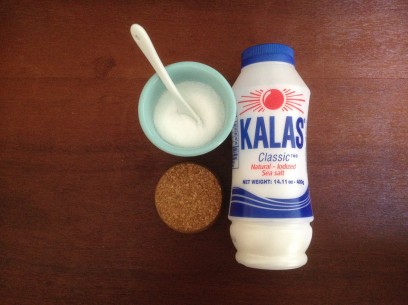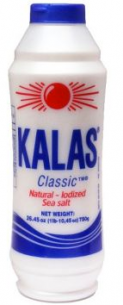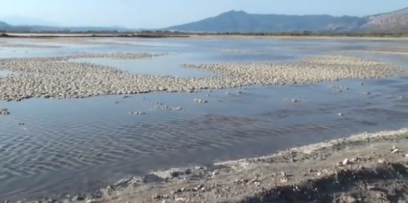No idea how it happened but there I was with a platter of gorgeous, hot, crispy outside meaty inside, Greek fried squash to serve and not a grain of salt to be had. None in the everyday shakers, none in the crock or the pantry. None even in the tiny crystal super-fancy shaker used only on very special occasions or the seasonal, slightly  kitschy Christmas tree or acorn shakers, nothing nowhere. In a growing panic and mounting desperation – yes, first world problems I know, I know – I scoured the far corners of the junk drawer in a last ditch effort to rescue my golden and now quickly-cooling tiganites. Towards the way back with hope fading fast, I bumped into a komboskini, said a quick prayer to Saint Euphrosynos saint of kitchens and soldiered on. In my head Tom Colichio disappointedly tells me to pack my shakers and go. Oh Tom, my Tom, I’m so sorry……. And while we’re on the subject, I know Tom is part Greek, I know it.
kitschy Christmas tree or acorn shakers, nothing nowhere. In a growing panic and mounting desperation – yes, first world problems I know, I know – I scoured the far corners of the junk drawer in a last ditch effort to rescue my golden and now quickly-cooling tiganites. Towards the way back with hope fading fast, I bumped into a komboskini, said a quick prayer to Saint Euphrosynos saint of kitchens and soldiered on. In my head Tom Colichio disappointedly tells me to pack my shakers and go. Oh Tom, my Tom, I’m so sorry……. And while we’re on the subject, I know Tom is part Greek, I know it.
Suddenly the tips of my fingers touched deliverance and I emerged from both my sad daydream and near hopeless salt quest VICTORIOUS! Out of the depths of the God-only-knows-what-all was in that drawer and in need of both a bandaid and some soap from having been bloodied, stabbed by a rogue bamboo skewer, and bumping into a random piece of rose loukoumi rolling around in there, I rescued THREE glorious red and white packets of take-out salt!!!!
The squash were saved, crisis averted. If only, I thought smugly, Varoufakis had a magic junk drawer like mine, he could solve all of Greece’s problems! Sadly, my triumph was almost as negligible as the finance minister’s tie collection. I’m sorry to tell you that inequity is alive and well in the salt world – not all salt is created equal. I am a Kalas salt girl through and through and these little packets were (heavy sigh) sad, sad substitutes.
Before going to bed that night, still more than mildly traumatized by earlier events, I ordered a
case of my blue and white bottled beauties. Don’t you just love the way the bottle just fits in your hand? And it’s opacity is just perfectly transparent enough so you can see the level of white salt against the white bottle when held up to the light. What the ancient Greeks (or should I say “the frisky ancient Greeks” given their history with sex toys!) once did with marble the modern Greeks do today with plastics extrusion.
Waiting for the rain to subside a bit before taking the dog out for last call, I wandered around the internet reading about salt. And yes, I often search and read about food and especially ingredients. Its fun so don’t snicker those of you whose search topics are always #trending.
Much of the information woke vague recollections from long ago anatomy and ancient history classes. Facts like (go ahead and impress your friends with these gems) we need salt to live, to properly regulate our nerve and muscle function – we cannot live without salt. Salt has served as currency – the word ‘salary’ in Latin means literally payment in salt (sal) – salt was considered as valuable as gold. The first salt harvest was recorded in 6000 BC making it one of the world’s oldest industries. Think on these tidbits the next time you casually sprinkle away
Kalas salt, as I found out, is harvested primarily in Messolonghi. Only knowing this famous city for it’s part in Greek revolutionary history, and I think Lord Byron lived nearby somewhere, I discovered that it is also one of the largest sea salt producing regions in Europe. The ocean water washes into/over shallow pools or lagoons as they’re called, where the sea salt rises to the surface and then is skimmed off. Ok that’s the bright yellow-covered “For Dummies” version but it gives you the idea.
Depending on the type of salt grain desired, the sea salt is washed and crushed and packaged with a minimal amount of, if any, processing. It’s so fascinating to me that scientists have found that salt is able to electrically suppress the bitter tasting notes in foods and amplify the sweeter notes. You know how we salt eggplants in order to draw out the bitterness? There is a real, scientific reason behind this kitchen tradition passed down through countless generations. Somewhere in my head I’m imagining how Teresa Giudice would explain this process to Andy on WWHL……
And apparently professionals disagree about this but to me, there is a big taste difference in the flavor of regular table salt and Greek sea salt. Table salt is more bitter. Maybe because it’s mined from underground, although mined salt is still taken from ancient dried sea beds, I think it has an old almost stale and sometimes metallic taste to it. Greek sea salt has a brighter flavor, sweeter and milder in a way. It tastes fresh and clean and to me makes everything you put it on or in just better. Did you know, one of the marks of a great chef is the ability to season (salt) their dishes perfectly? My dad always reminds me when we’re working on a new recipe for The Greek Vegan to season and taste 3 times at least before the dish is done to make sure the balance is exactly right. Two of my siblings share my father’s tastebuds of epic ability. My tongue is apparently a few buds too short in some cases and I miss nuances that are blatantly obvious to them. But I’m really good at kneading dough though! (envious sigh)
Back to salt for another sec, how cool is it that this mineral (for that is what it is) can both dissolve and preserve things? And we use it in both sweet and savory cooking – try sprinkling a touch of salt on a halved grapefruit, you’ll go crazy it’s so good!
Salt helps our bread dough to rise, dehydrates fish and pickles vegetables. My yiayias used to clean with it, especially the sink drains – come to find out salt has antibacterial properties too which of course your dentist already knows about because he recommends swishing with salt water for oral care. Consult with your Dentist in Seattle if you don’t believe me. It’s great if you get quite a few mouth ulcers. Mix it with vinegar and you have a cleaning paste that keeps your pot bottoms shiny and new with no need for harsh chemicals – take that Dow Chemical.
In conclusion, salt is pretty **&&$$##!! cool, sea salt is super cool and Greek sea salt the bomb (yes, I’m bringing that back)! And don’t get distracted by the flashy shelf-sharers like Pink Himalayan – go Greek or go home people. Do your part for the motherland’s economy and keep Angela Merkel at bay with each grain, each shake and each sprinkle. Hey, didn’t people use salt to keep away vampires? Just saying …… Kiki 🙂




